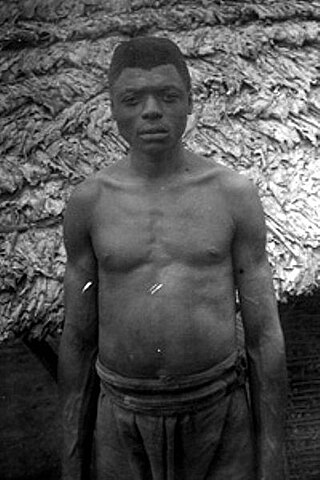Top Qs
Timeline
Chat
Perspective
Kimbanguism
Christian new religious movement From Wikipedia, the free encyclopedia
Remove ads
Kimbanguism (French: Kimbanguisme) is a para-Christian new religious movement professed by the African initiated church Jesus Christ's Church on Earth by his special envoy Simon Kimbangu (French: Église de Jésus Christ sur la Terre par son envoyé spécial Simon Kimbangu, EJCSK) founded by Simon Kimbangu in the Belgian Congo (today the Democratic Republic of the Congo) in 1921. A large, independent African-initiated church, it has an estimated 6 million believers[citation needed] and has its headquarters in Nkamba, Kongo Central. The denomination became a member of the World Council of Churches, the All Africa Conference of Churches, and the Organization of African Instituted Churches. In June 2021, the World Council of Churches withdrew membership on doctrinal grounds.[2][3]
This article needs additional citations for verification. (August 2013) |

Remove ads
History
In April 1921, Kimbangu, a Baptist mission catechist, inaugurated a mass movement through his supposed miraculous healings and biblical teaching. His teachings attracted working people, who left jobs to hear him speak about liberation. This threatened the colonial labor structure and thus the Belgian regime.[4] The Belgian authorities treated the faith with suspicion and imprisoned Kimbangu until his death in 1951. The church was formally recognised by the Belgian colonial authorities in 1959.
Some smaller, more loosely organised groups in Central Africa regard Kimbangu as God's prophet.
Life and works of Kimbangu
According to the church,[citation needed] Kimbangu is said to have come down to Earth from Mount Zion as a Congolese infant. His father had been a traditional religious leader, but both parents died and Kimbangu was orphaned and put in the care of his maternal aunt. She took him to Baptist missionary school where he studied for many years, until he grew up and became a preacher.[citation needed] Some statisticians have estimated that the number of Kimbanguists to be thirty two million.[1]
Remove ads
Beliefs and practices
Summarize
Perspective

The church eschews politics and embraces Puritan ethics, rejecting the use of violence, polygamy, magic and witchcraft, alcohol, tobacco, and dancing. Its worship is Baptist in form, though the Eucharist was not introduced until 1971.
The three key dates in the Kimbanguist calendar are 6 April (marking the date of the start of the ministry of healing), 25 May (marking Christmas,[5] falling on the birthday of Father Dialungana), and 12 October (Kimbangu's death anniversary). The church is largely non-sacramental, with large services that are well-organised.
The church also believes that Nkamba is the New Jerusalem mentioned in the Bible.
The church also believes that Kimbangu is the Holy Spirit,[citation needed] in accordance with John 14:15–17. Like many Christian groups, the Kimbanguists begin and end prayers with the Trinitarian formula.
Alongside Kimbangu, the Trinity are Father Kisolokele (first son of Kimbangu) as God the Father, Father Salomon Diangani Dialungana (the reincarnated Jesus and second son of Kimbangu), Father Diangienda Kuntima (last son, reincarnation of Kimbangu and second human form of the Holy Spirit), and Father Simon Kimbangu Kiangani (grandson of Kimbangu, third human form of the Holy Spirit, and current spiritual leader of the church since 2001).[citation needed]
The doctrinal status given by this church to Kimbangu has led to international controversy as contrary to the doctrine of the Trinity and therefore heretical. In 2021 the church’s membership in the World Council of Churches (WCC) was discontinued by the Central Committee of the WCC on theological grounds.[6]
Remove ads
Hierarchy

- The spiritual head (Diangienda)
- Adjunct spiritual heads (Dialungana and Kisolokele – the other sons of Simon Kimbangu)
- Bansadisi (healers)
- Legal representatives of churches in the various countries
- Regional representatives and their staffs
- Subregional representatives and their staffs
- Main parish ministers, evangelists and helpers
- Parish-section ministers, evangelists and helpers
- Congregants
See also
References
Further reading
External links
Wikiwand - on
Seamless Wikipedia browsing. On steroids.
Remove ads

